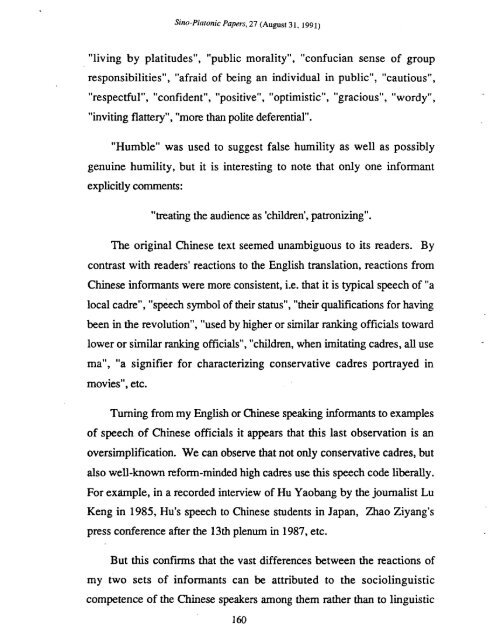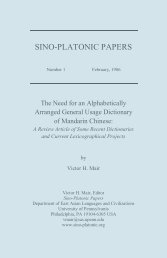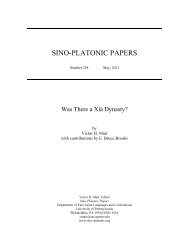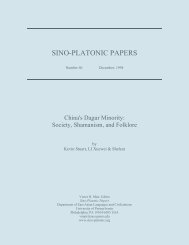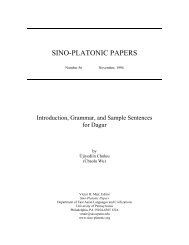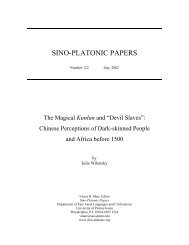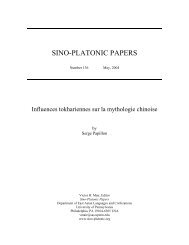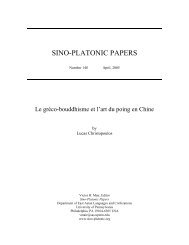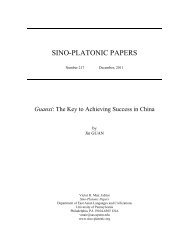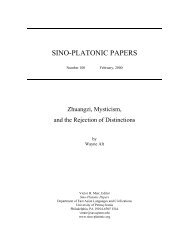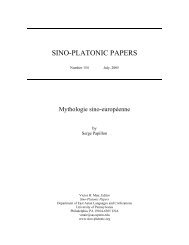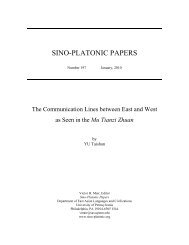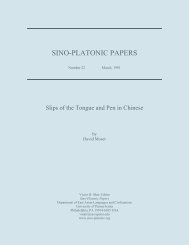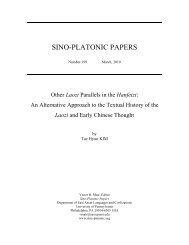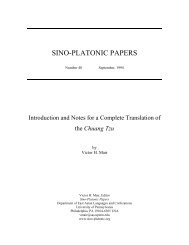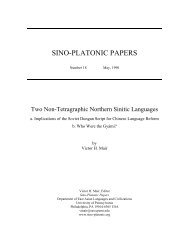Essays on Writing and Language in Honor - Sino-Platonic Papers
Essays on Writing and Language in Honor - Sino-Platonic Papers
Essays on Writing and Language in Honor - Sino-Platonic Papers
You also want an ePaper? Increase the reach of your titles
YUMPU automatically turns print PDFs into web optimized ePapers that Google loves.
S<strong>in</strong>o-Plat<strong>on</strong>ic <strong>Papers</strong>, 27 (August 3 1. 1991)<br />
"liv<strong>in</strong>g by platitudes", "public morality", "c<strong>on</strong>fucian sense of group<br />
resp<strong>on</strong>sibilities", "afraid of be<strong>in</strong>g an <strong>in</strong>dividual <strong>in</strong> public", "cautious",<br />
"respectful", "c<strong>on</strong>fident", "positive", "optimistic", "gracious", "wordy",<br />
"<strong>in</strong>vit<strong>in</strong>g flattery", "more than polite deferential".<br />
"Humble" was used to suggest false humility as well as possibly<br />
genu<strong>in</strong>e humility, but it is <strong>in</strong>terest<strong>in</strong>g to note that <strong>on</strong>ly <strong>on</strong>e <strong>in</strong>formant<br />
explicitly comments:<br />
"treat<strong>in</strong>g the audience as 'children', patr<strong>on</strong>iz<strong>in</strong>g".<br />
The orig<strong>in</strong>al Ch<strong>in</strong>ese text seemed unambiguous to its readers. By<br />
c<strong>on</strong>trast with readers' reacti<strong>on</strong>s to the English translati<strong>on</strong>, reacti<strong>on</strong>s from<br />
Ch<strong>in</strong>ese <strong>in</strong>formants were more c<strong>on</strong>sistent, i.e. that it is typical speech of "a<br />
local cadre", "speech symbol of their status", "their qualificati<strong>on</strong>s for hav<strong>in</strong>g<br />
been <strong>in</strong> the revoluti<strong>on</strong>", "used by higher or similar rank<strong>in</strong>g officials toward<br />
lower or similar rank<strong>in</strong>g officials", "children, when imitat<strong>in</strong>g cadres, all use<br />
ma", "a signifier for characteriz<strong>in</strong>g c<strong>on</strong>servative cadres portrayed <strong>in</strong><br />
movies", etc.<br />
Turn<strong>in</strong>g from my English or Ch<strong>in</strong>ese speak<strong>in</strong>g <strong>in</strong>formants to examples<br />
of speech of Ch<strong>in</strong>ese officials it appears that this last observati<strong>on</strong> is an<br />
oversimplificati<strong>on</strong>. We can observe that not <strong>on</strong>ly c<strong>on</strong>servative cadres, but<br />
also well-known reform-m<strong>in</strong>ded high cadres use this speech code liberally.<br />
For example, <strong>in</strong> a recorded <strong>in</strong>terview of Hu Yaobang by the journalist Lu<br />
Keng <strong>in</strong> 1985, Hu's speech to Ch<strong>in</strong>ese students <strong>in</strong> Japan, Zhao Ziyang's<br />
press c<strong>on</strong>ference after the 1 3 th plenum <strong>in</strong> 1 987, etc.<br />
But this c<strong>on</strong>firms that the vast differences between the reacti<strong>on</strong>s of<br />
my two sets of <strong>in</strong>formants can be attributed to the sociol<strong>in</strong>guistic<br />
competence of the Ch<strong>in</strong>ese speakers am<strong>on</strong>g them rather than to l<strong>in</strong>guistic


